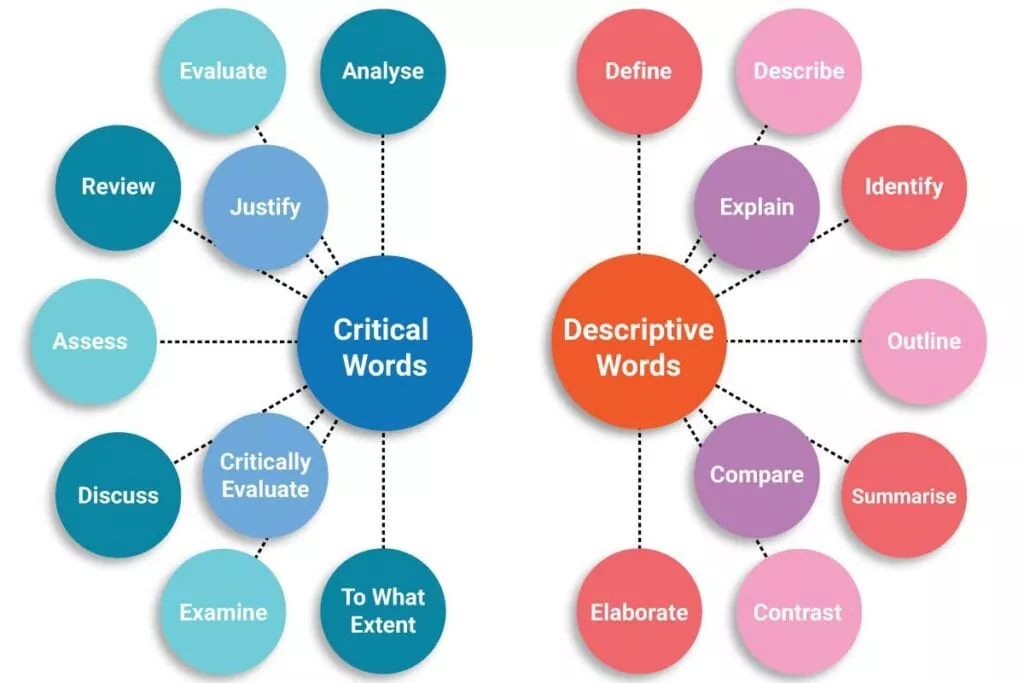Decoding Essay Question Words for Academic Success
Do you need help understanding what your essay question is asking? Are you perplexed by terms like 'analyze', 'evaluate', and 'discuss'? You're not alone. Decoding essay question words is a common challenge for many students, but fear not because help is at hand. In this article, we will unravel the mysteries of these essay question words, providing you with the keys to unlocking academic success. Whether you're a high school student preparing for exams or a college student working on a research paper, understanding the true meaning behind these words is crucial. By the end of this article, you'll clearly understand what your professors are looking for when they use these terms, and you'll be equipped with the knowledge to craft stellar essays that impress and earn top grades. So, let's dive in and decode those essays question words together!

Understanding Essay Question Words
When writing essays, understanding the question is the first step towards success. Essay question words provide essential clues about what your professors expect from your response. These words serve as guideposts, directing you to address specific aspects of the topic. By deciphering these question words, you can tailor your essay to meet the requirements and demonstrate your understanding of the subject matter.
Common Essay Question Words and Their Meanings
To effectively decode essay question words, it's essential to familiarize yourself with their meanings. Let's explore some common question words and their corresponding definitions:
- Analyze: This word requires you to break down a complex topic into its constituent parts and examine each individually. It would help if you explored the relationships between these parts and thoroughly analyzed their significance.
- Evaluate: When you encounter this word, you must judge the value or importance of a particular concept, idea, or argument. Your evaluation should be supported by evidence and logical reasoning.
- Discuss: This word calls for comprehensively examining a topic from multiple perspectives. You should present different viewpoints and engage in a balanced discussion, highlighting the advantages and disadvantages of each.
- Compare: If you come across this word, you're expected to identify similarities and differences between two or more subjects. Your analysis should go beyond a simple list of similarities and differences, delving into the implications and significance of these comparisons.
- Contrast: Similar to 'compare', 'contrast' requires you to identify differences between two or more subjects. However, in this case, the focus is solely on highlighting the disparities rather than similarities.
- Explain: This word demands a clear and concise account of the reasons behind a particular phenomenon or concept. You should provide a logical and coherent explanation supported by evidence and examples.
Understanding the meanings of these common essay question words allows you to approach your essays with greater clarity and confidence.
Analyzing Essay Question Words
Now that we have a basic understanding of common essay question words let's delve deeper into the process of analyzing them. Analyzing essay question words involves breaking them down into their constituent parts and identifying the key elements they ask you to address. This process will help you formulate a clear and focused thesis statement, essential for developing a well-structured and coherent essay.
To analyze the essay question words effectively, follow these steps:- Read the question carefully: Take the time to read the question multiple times, ensuring that you fully grasp its meaning and requirements.
- Identify the critical question word: Highlight or underline the key question word used in the prompt. This word will determine the focus of your response.
- Define the question word: Refer to the definitions of common question words and determine which purpose aligns with the vital question word in your prompt.
- Break down the prompt: Identify any additional keywords or phrases that provide further insights into the specific aspects you need to address in your essay.
By following these steps, you can analyze the essay question words effectively and develop a clear roadmap for your essay.
Interpreting Essay Question Words
Once you have analyzed the question and identified the critical question word, the next step is interpreting its meaning. Solving essay question words involves understanding the nuances and subtleties of the word and tailoring your response accordingly. Let's explore some strategies for solving common essay question words:
- Contextualize the question: Consider the topic's broader context and the assignment's purpose. This will help you determine the appropriate depth and scope of your response.
- Consider the subject matter: Reflect on the subject matter being addressed in the question and identify any relevant theories, concepts, or frameworks that can guide your interpretation.
- Consult additional sources: If you're unsure about the meaning of a question word, consult reputable academic sources or contact your professor for clarification.
- Examine sample essays: Look for sample essays that have successfully addressed similar question words to gain insights into effective interpretation strategies.
By interpreting essay question words accurately, you can provide a nuanced and focused response demonstrating your understanding.
Decoding Complex Essay Question Words
While some question words may have straightforward definitions, others can be more complex and require careful consideration. Let's explore some examples of difficult essay question words and strategies for decoding them:
- Critically evaluate: This phrase calls for an in-depth analysis beyond simple evaluation. You need to assess the strengths and weaknesses of a particular argument or theory, considering multiple perspectives and supporting your research with evidence and logical reasoning.
- To what extent: This phrase requires you to assess the degree to which a statement or claim is true. You should provide a balanced analysis, considering supporting and opposing arguments, and arrive at a well-reasoned conclusion.
- Discuss the implications: This phrase demands an exploration of the consequences and significance of a particular concept or event. Consider the broader implications and draw connections to related topics or theories.
You can craft well-rounded and insightful essays by breaking down complex question words and considering their broader implications.
Tips for Answering Essay Question Words Effectively
Now that we have decoded essay question words and explored strategies for analyzing and interpreting them let's delve into some tips for answering these question words effectively:
- Plan your essay: Before you begin writing, outline your main arguments and supporting evidence. This will help you stay focused and organized throughout the writing process.
- Use evidence and examples: Support your arguments with evidence and examples from reputable sources. This will demonstrate your ability to apply critical thinking and support your claims.
- Stay on topic: Ensure your essay addresses the question and focuses on the critical question word. Avoid going off on tangents or including irrelevant information.
- Proofread and edit: Take the time to thoroughly proofread and edit your essay to ensure clarity, coherence, and proper grammar. This will enhance the overall quality of your work.
By following these tips, you'll be able to craft well-structured, insightful, and persuasive essays that meet the requirements of the question words.
Examples of Essay Question Words and How to Approach Them
To further illustrate the concepts we've discussed so far, let's explore some examples of essay question words and how to approach them:
- Analyze the impact of climate change on biodiversity: In this question, the critical question word is 'analyze'. To effectively address this prompt, you should break down the concept of climate change and biodiversity, examining interrelationships and providing a comprehensive analysis of the impact of climate change on biodiversity.
- Evaluate the effectiveness of the healthcare system in reducing infant mortality rates: Here, the critical question word is 'evaluate'. To answer this question, you need to make a judgment about the effectiveness of the healthcare system in reducing infant mortality rates. Support your evaluation with evidence and consider alternative viewpoints.
- Discuss the role of technology in shaping modern communication: This prompt requires a balanced discussion of the role of technology in shaping modern touch. Present different perspectives, highlight advantages and disadvantages, and provide examples to support your arguments.
You can craft well-rounded and compelling essays by approaching these examples with a clear understanding of the question words and employing the strategies we've discussed.
Strategies for Organizing Your Essay Based on Question Words
To ensure a coherent and logical flow in your essay, you must organize your thoughts and arguments effectively. Let's explore some strategies for managing your report based on question words:
- Analyzing: Start with an introduction that provides context and a clear thesis statement. Then, organize your body paragraphs around the key elements you need to analyze, addressing each in a separate section. Finally, summarise your essay with a conclusion summarising your analysis and restating your main arguments.
- Evaluating: Begin with an introduction that sets the stage for your evaluation. Next, present your homework in a series of body paragraphs, each focusing on a specific aspect or criterion. Provide evidence and reasoning to support your evaluation. Conclude by summarizing your evaluation and offering final thoughts.
- Discussing: Structure your essay with an introduction overviewing the topic and presenting your thesis statement. Dedicate each body paragraph to a different perspective or viewpoint, providing evidence and analysis to support each. Conclude by summarizing the main points discussed and offering a balanced view.
Organizing your essay based on the question words will create a logical and coherent narrative that guides your readers through your arguments.
Evaluating Your Essay Based on Question Words
Once you have written your essay, evaluating it based on the question words is essential. Assessing your essay allows you to ensure that you have addressed the requirements of the prompt and met the expectations of your professors. Here are some key aspects to consider during the evaluation process:
- Relevance: Does your essay directly address the critical question word? Have you stayed focused on the topic and avoided irrelevant information?
- Depth of analysis: Have you comprehensively analyzed the relevant aspects? Do evidence and examples support your research?
- Coherence and structure: Does your essay have a clear and logical flow? Are your arguments well-organized and easy to follow?
- Critical thinking: Have you demonstrated critical thinking skills by examining multiple perspectives and providing a balanced analysis?
By critically evaluating your essay, you'll be able to identify any areas that require improvement and make necessary revisions to enhance its overall quality.
Conclusion
Decoding essay question words is a crucial skill for academic success. By understanding the meanings of common question words, analyzing and interpreting them, and employing effective strategies for answering and organizing your essays, you can craft stellar academic papers that impress your professors and earn top grades. Remember to carefully read and analyze the question, plan your essay, support your arguments with evidence, and critically evaluate your work. With practice and perseverance, you'll become a master at decoding essay question words and excel in your academic pursuits. So, go forth and conquer those essay questions with confidence!



